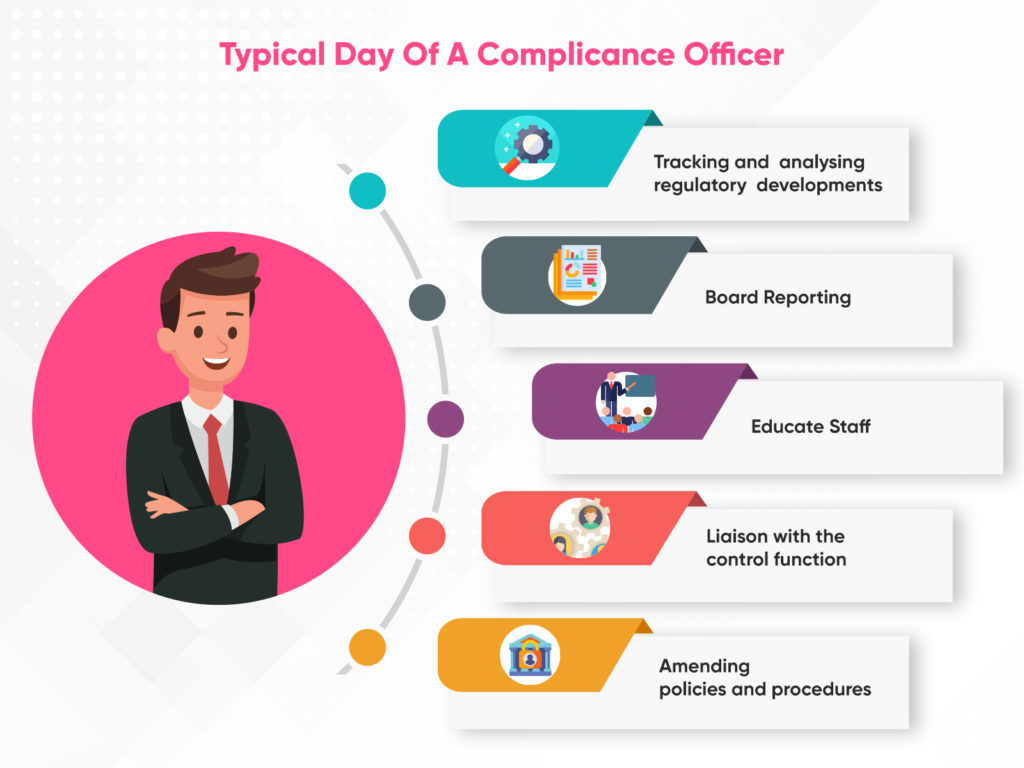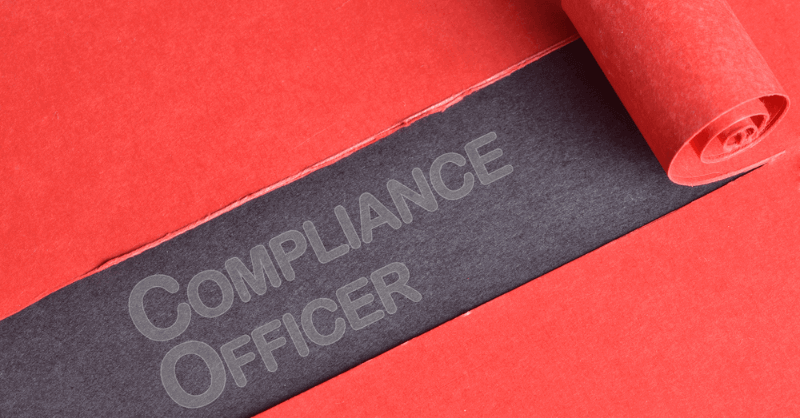Are you dreaming of having a corporate job? Have an inclination towards a compliance officer? If you are looking for a guideline on how to become a compliance officer, you have come to the perfect blog post. I will assist you towards your journey on becoming a compliance officer.
Stay tuned!
Table of Contents
Who is a Compliance Officer?
First of all, we will try to define a compliance officer.
A compliance officer is a person who is employed to ensure that a company does not conflict with any statutes or regulations which apply to its activities. He/she also provides that the firm complies with its external regulatory and legal conditions. They also collaborate with internal policies and local laws. The chief compliance officer is usually the head of a firm’s compliance department.
Their primary role is to help the senior management of their firm. They also make sure and observe the rules and principles set by regulators.
Roles of a Compliance Officer

The duties of a compliance officer can be broadly divided into 3 types:
Entry- level roles
It is the beginner level work, the work with which you will start your career as a compliance officer. These includes:
- Screen customers’ names and identity documents to make sure that they don’t have any criminal issues. It works as a clean chit for the company.
- Check domestic and international payments to ensure that money isn’t getting into the wrong hands and funding terrorism.
- Monitor transactions for suspicious activity to identify if a customer is using their account fraudulently.
- Fulfil requests from law enforcement agencies for information that is important for ongoing criminal investigations.
High-level roles
- Managing processing teams
- Capacity planning
- Managing staff performance
- Development and assuring the smooth running of the team.
- Carrying out audit functions
- Writing policies and procedures based on regulations/legislation
- Liaising with stakeholders to ensure these rules are following accordingly
- Report money laundering
- Oversight all activities related to compliance
Mixed-level roles
It is a combination of high-level and entry-level work. There isn’t a one-size-fits-all approach to enjoying a career in compliance.
You may have to:
- Carry out both customer and payment screening
- Responsible for managing people and also writing policies
- Monitor transaction while carrying out audit functions
How Do Compliance Officers Work?
A compliance officer is the employee of a company who helps that company maintain policies and procedures. He/she also has to make sure that these procedures remain within an industry’s regulatory framework.

His/her work may contain:
- Reviewing and setting standards for external communications by requiring disclaimers in emails or examining facilities to ensure they are accessible and safe.
- Design or update internal policies to reduce the risk of the company breaking laws and regulations and lead internal audits of procedures.
- Must have a thorough knowledge of the company and an awareness of where possible regulatory breaches may occur.
- Communicate the company’s fundamental ethical principles and compliance regulations.
- Organise regular training sessions for employees to communicate necessary regulatory changes and updates.
- Have appropriate disciplinary measures in the station to dodge future recurrence.
- Ensure frequent monitoring and inspection of compliance procedures to identify possible areas where improvements could be performed.
- Analyse company operations to determine compliance risk.
- Coordinating and scheduling needed compliance training for employees.

Job Description
Compliance is a far-flung area to work on. It is an enormous occupational title that is connected to many industries. Specific job designations that fall under this sunshade include, but are not confined to:
- Environmental compliance inspector
- Licensing examiner or inspector
- Equal opportunity representative or officer
- Director of Corporate Compliance
- Government property inspector or investigator
- Regulatory affairs specialist
- Compliance Analyst
- Quality Compliance Coordinator
- Research Compliance Specialist
- Safety Compliance Specialist
Different types of jobs have distinct works to do. They ensure that companies obey regulations, comply with laws, follow strategies and contractual commitments, satisfy eligibility requirements for licenses and permits, etc.
How to Become a Compliance Officer
Yes, you have come to the key attraction of this blog!
Now, let’s get started with the nitty-gritty of how to become a compliance officer.
1. Education
Compliance is the field which is not obsessed with where and what you studied. Bachelor degree in any discipline can enter into this profession. But as a general rule, there is a preference of

- Number Based Degrees (like Economics)
- Commercial Degrees (such as Business Administration or Business Studies)
- Law Degrees
But if you don’t have any of the degrees as mentioned above, no need to worry at all. Almost all employers are flexible enough to accept your degree from any discipline.
Entry Requirements:
Entry to degree courses demands typically at least two A levels and five GCSEs (A*-C), or equivalent qualifications, such as the Advanced Diploma in business, administration and finance.
2. Certification
Sometimes certification is needed to get a better job option. The International Compliance Association (ICA) generally offers the certification. This include:
Advanced Certificate in Compliance
It is an introductory course. This course usually takes six months to complete.
Diploma in Compliance
It is a bit of an upper-level program which is not open to all. This course is only applicable to those who have a degree or appropriate professional qualification. If you hold the Advanced Certificate or have at least three years’ relevant work experience, you can apply for this certification.
The time duration for the diploma in Compliance is 9 to 12 months.
The International Compliance Association also offers:
- Certificate and Diploma in Anti Money Laundering
- Certificate in Financial Crime Awareness
- Diploma in Financial Crime Prevention
The Chartered Institute for Securities and Investment proposes the Diploma in Investment Compliance. They provide it for compliance professionals who work in the securities and investment industry.
3. Online Course
There are plenty of online learning platforms that give certification also. You can join a compliance officer training course and become a compliance officer. The course is typically one year long. Moreover, you can sit on your couch and do your development. It can be delivered on desktops, laptops, tablets or smartphones.
See, a perfect combo of comfort and learning.
4. Skills and Abilities
Well, being a compliance officer is not easy-peasy work! You should develop zillions of skills within yourself. It is essential to plan and conduct an honest self-assessment of your knowledge, skills and abilities to impress the employers.

Knowledge
- Rules, standards, and regulations
- Ethical business actions and reactions
- Sentencing guidelines
- Governance
- External and internal audits
- Risk management
- Safety specifications
Skills
- Critical thinking and problem-solving skills. Many times you have to make decisions with the little available information. Don’t expect to have them always in black and white.
- You have to analyse and interpret information quickly. Sometimes you need to make decisions within a few minutes!
- Project management skills, as you're supposed to juggle several projects at one time.
- You must adopt negotiation and communication skills in you. It helps to get businesses in line and other managers to buy into your compliance strategies.
- As a compliance officer, you should spread your network like a spider web. For this building, networking skills are crucial.
- Without ethics, you will suffer in the long run. You have to be ethical and always have the will to do the right things.
Abilities
- Leadership
- Analytical
- Verbal and written communication
- Interpersonal conveying
- Attention to detail
- Integrity
- Punctual
- Public speaking
- Decision making
Oh, my goodness!! Heck of skill is needed!! Best of luck on that!
5. Work Experience
Work experience is very much pivotal. In the United Kingdom, compliance is a fast-growing sector, but there is a shortage of skill.
Unlike many other sectors, compliance does not have set criteria for work experience and qualifications. So your main focus is often identifying your transferable skills. But to cope with the competition, you want to stay in the frontline of this race. For this, you can join any relevant office as a part-time job. It will add some experience in your pocket when you enter into the real job field.
Examples of unrelated but relevant roles where you can join as a part-time employee:
- Pre-employment screening coordinato
- Administration executive
- Financial analyst
- Paralegal
- Customer services
6. Search for Job
Now you are all set for the job hunt.
The demand for compliance officers is skyrocketing day by day, although entry is very competitive. In the United Kingdom, you will find plenty of compliance jobs. These jobs are mainly concentrated in the major financial hubs, such as London, Birmingham, Leeds, Manchester, Bristol, Glasgow, Edinburgh, and Norwich.

The leading employers include:
- Banks
- Insurance companies
- Stockbrokers
- Firms of independent financial advisers
- Investment specialists
- Foreign exchange trading houses
- Regulators
Besides, other sectors, like investment banks and financial services firms also employ money-laundering specialists and other compliance officers. Consultancy firms are also recruiting compliance officers to deal with compliance related occurrence and risks.
7. Training
As a compliance officer, you will start your career in an entry-level position. At this stage, you often shadow another compliance officer while working as a fresher for training. Thus working under a senior officer, you will get experience. Your supervisor will also transfer his/her skills, knowledge, ethics, and way of thinking in you.
Work Schedule
You are probably thinking about how long you have to work.
Well, the typical office time is 8.30 am to 5.30 pm. It means you have to work 45 hours per week. But some factors affect the number of working hours, say, your location and sector of work. Work schedule varies because of the broad range of types of compliance officer jobs and responsibilities.
Nowadays, many employers are interested in recruiting on a day-rate basis, i.e. being paid per day rather than by the hour. Paid overtime is rare as many other professional roles.
Work Environment
As a compliance officer, your typical workday will depend on many terms. These may include the industry, your role and the size of the organisation. The environment can range from ideal office settings to outside field visit, checking anything from roads to construction sites to pipelines, and many more.
The work is sometimes associated with stress when failing to maintain specific standards. It can result in government fines or other forms of financial loss. Besides, employees might occasionally view compliance officers negatively, as someone looking over their shoulders, policing their work.
Career Opportunities
Industries are focusing on compliance more than ever. So the opportunities to develop your career as a compliance officer is continuously growing.
Can you imagine the rate of promotion? Don’t take a wild guess. Many junior compliance officers are promoted to senior officers within two to four years. It’s super fast. I know, right? If you work with a renowned firm, you’re likely to find that your career path is linear. In which you may progress from analyst level to associate vice president to vice president!
See? A huge opportunity is waiting for you there!
How Much Will You Make?

Ahhh, the most satisfying part!
Though the payments may vary from industry to industry, employer to employer. When you work with a bank, you will get more remuneration than in charities. However, the typical scenario is:
- The average salary of a compliance officer is £34,135 per year.
- Trainees or junior officers may earn between £18,000 and £30,000 in a year.
- Per year a compliance manager can make from £30,000 to £75,000.
- Senior managers can earn up to £100,000 or more.
- Day rates for entry-level employees start from £200 per day.
Do you need more to have a prosperous life? I guess it’s quite sufficient! Don’t forget about the bonuses!
Bottom Line
I attempted to make you well aware of the nook and corner of how to become a compliance officer. I also try to enlighten you with all the vital info related to the job and career paths of compliance.
I hope you get all the details you want and I’m expecting that you loved it.
So, what are you up to? Buckle up and jump to the field! Wishing you a very lucrative future. I know you will have one.
Take care, and good luck!
Read more
- Upskill for Impact: Online Guide to Boosting Your Teaching with Professional Development
- Free Online Courses: How to Study Online Courses for Free in 2024
- Mastering the Dissertation: A Comprehensive Guide to Academic Success
- Challenging Behaviour in the Classroom [Types & Solution]
- The Impact Of Remote Work On Women In The Marketing Industry
- Differentiating Web Design and Web Development
- Top 10 Social Media Management Tools for Businesses in 2024
- Why is Child Development so Important in Early Years
- Line Management: How to be a Good Line Manager?
- How Long Should a Health Sector Career Take?







 August 15, 2023
August 15, 2023








